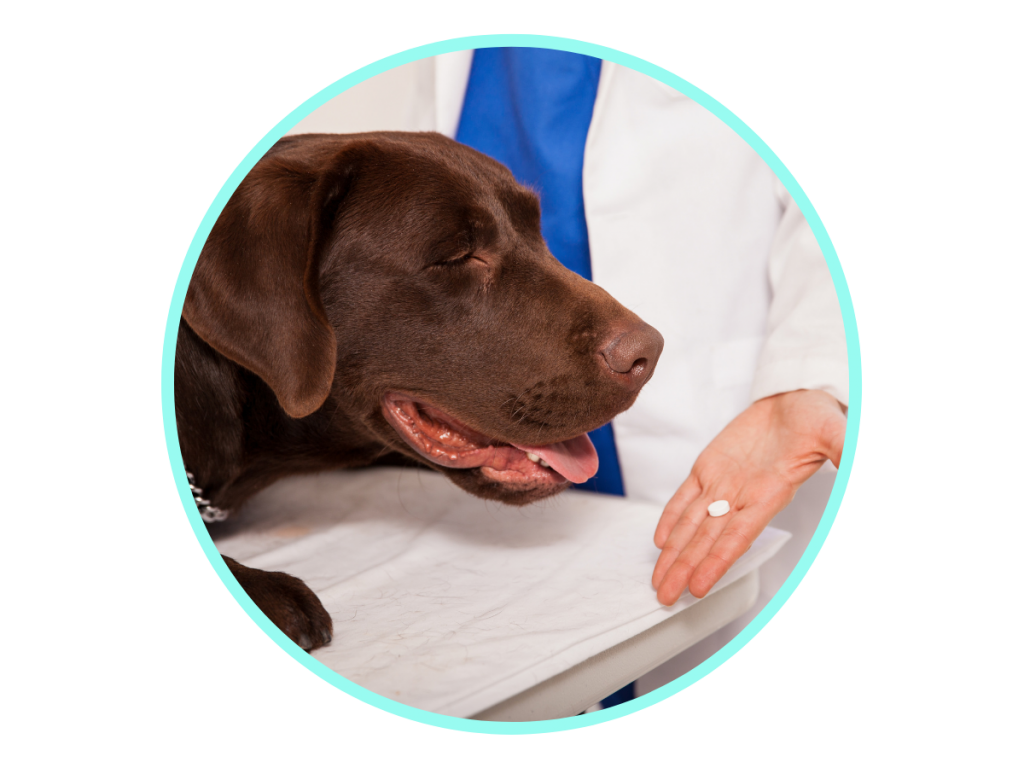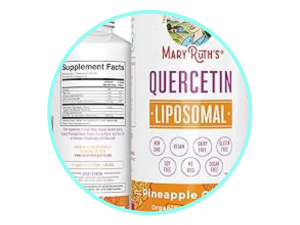





Quercetin for dogs is a non-prescription medication that’s often used for long-term allergies and inflammation. It’s a natural option for dogs that are bothered by allergy problems from one season to another. Quercetin for dogs acts as an antihistamine and anti-inflammatory agent making it a viable choice for allergy relief.
At AvenueDogs.com, we regularly get asked about certain dog-friendly medications. Quercetin for dogs is no different. Today, we’ll go into detail about what this prescription-free medication is, what it can do for your pup, and how you can start using it to your dog’s advantage. So, without further ado, let’s get to it!
If you’d like to know more about home medications that can help your pet, check out our vet-approved list below:
| Dyne for Dogs: For Energy & Weight Gain | Omeprazole for Dogs: For Ulcers & Inflammation | Enrofloxacin for Dogs: For Bacterial Infections |
Cefpodoxime for Dogs: For Bacterial Infections | Sucralfate for Dogs: Chronic Upset Stomach | Cosequin for Dogs: For Joint Health |
| Ursodiol for Dogs: For Liver & Gallbladder | Trazodone for Dogs: For Anxiety & Aggression | Mometamax for Dogs: For Ear Infections |
| Credelio for Dogs: For Ticks & Fleas | Chlorpheniramine for Dogs: For Allergy-Related Conditions | Butorphanol for Dogs: For Painful Coughs |
| Dinovite for Dogs: For Irritating, Itchy Coat | Dasuquin for Dogs: For Joint Health | Meloxidyl for Dogs: For Pain & Inflammation |
| Glandex for Dogs: For Digestive Support | Rilexine for Dogs: For Bacterial Infections | Enalapril for Dogs: For Cardiac Conditions |
| Quercetin for Dogs: For Allergy & Inflammation | Carprovet for Dogs: For Pain & Inflammation | Pimobendan for Dogs: For Congestive Heart Failure |
| Simplicef for Dogs: For Bacterial Infections | Clindamycin for Dogs: For Bacterial Infections |
Until then, check out some of the best info we could find on Quercetin for dogs.
Top 10 FAQs for Quercetin for Dogs
Quercetin is a well-known option for dogs in the veterinary industry. However, there are a lot of questions surrounding Quercetin for dogs among owners. We’ve compiled a list of the top 10 FAQs surrounding this medication designed for allergy relief.



(Keep in mind: Avenue Dogs is reader-supported. When you buy through links on our site, we may earn an affiliate commission (with no additional cost to you)).
#1 What Is Quercetin, And How Does It Benefit Dogs?
Quercetin is a type of flavonoid found in many fruits and vegetables, acting as a natural antihistamine and anti-inflammatory agent. In dogs, it can help manage symptoms of allergies, reduce inflammation, and support overall health by neutralizing free radicals.
#2 Is Quercetin Safe For All Dogs?
While Quercetin is generally safe for most dogs, it’s not suitable for every dog. Dogs with certain health conditions or those on specific medications should only use Quercetin under veterinary supervision to avoid potential interactions or side effects.
#3 How Is Quercetin Administered To Dogs?
Quercetin can be administered orally, either in capsule form, as a powder mixed into food, or within commercially available treats formulated with Quercetin. The best method depends on your dog’s preferences and the specific product’s instructions.
#4 What Dosage Of Quercetin Is Recommended For Dogs?
The recommended dosage of Quercetin for dogs varies based on the dog’s weight, health status, and the severity of symptoms. Generally, dosages range from 5-10 mg per pound of body weight, given twice daily, but always consult a vet for a tailored dose.
#5 Can Quercetin Be Given With Other Medications?
Quercetin can interact with certain medications, such as antibiotics or steroids, potentially affecting their efficacy. It’s essential to consult a veterinarian before combining Quercetin with any other medications.
#6 What Are The Potential Side Effects Of Quercetin In Dogs?
Side effects are rare but can include gastrointestinal upset, such as vomiting or diarrhea. If you notice any adverse reactions in your dog after administering Quercetin, consult your veterinarian.
#7 How Quickly Does Quercetin Work In Dogs?
The effects of Quercetin can vary, with some dogs showing improvements in allergy symptoms within a few days, while others may need a few weeks to exhibit benefits. The response time can depend on the individual dog and the condition being treated.
#8 Can Quercetin Be Used Long-Term For Dogs?
Quercetin can be used as a long-term supplement for dogs, especially for chronic conditions like allergies. However, long-term use should be under veterinary guidance to monitor for any potential side effects or interactions.
#9 Are There Any Dogs That Should Not Take Quercetin?
Dogs that are pregnant, nursing, or have certain health conditions like kidney or liver disease should avoid Quercetin, or only use it under strict veterinary supervision due to the potential for complications.
#10 Where Can I Find Quercetin Supplements For My Dog?
Quercetin supplements can be found in pet stores, online, or through your veterinarian. Look for products specifically formulated for pets to ensure proper dosage and safety. Always choose high-quality, reputable brands to guarantee the supplement’s efficacy and purity.



Now that we have a better understanding of what Quercetin for dogs can and can’t do, let’s look into the medication more in-depth. If you think Quercetin could be a good fit for your pup, talk with your vet to make the final call!
What is Quercetin for Dogs?
Quercetin for dogs is a dietary supplement derived from a natural compound known as a flavonoid. Quercetin is found in many plants and foods such as apples, berries, broccoli, and onions. Quercetin for dogs is recognized for its potent antioxidant properties, which can help protect the body’s cells from damage caused by oxidative stress and free radicals.
In addition to its antioxidant capabilities, Quercetin acts as a natural antihistamine and anti-inflammatory agent. These properties make it a popular choice among dog owners who are seeking natural ways to support their pet’s health – particularly in managing conditions related to inflammation and allergies.



As a supplement, Quercetin is administered to dogs to bolster their overall health and well-being, with a focus on mitigating allergic reactions and reducing inflammation.
What Does Quercetin for Dogs Do?
Quercetin for dogs serves several beneficial roles due to its natural antihistamine, anti-inflammatory, and antioxidant properties. Here’s a breakdown of the key benefits Quercetin can provide for your furry friend:
- Antihistamine Effect – Quercetin helps stabilize mast cells, which are cells that release histamine during allergic reactions. By preventing or reducing histamine release, Quercetin can alleviate symptoms associated with allergies, such as itching, swelling, and respiratory issues. This makes it particularly useful for dogs suffering from seasonal allergies, food allergies, or skin conditions like atopic dermatitis.
- Anti-inflammatory Properties – Inflammation is a body’s natural response to injury or infection, but chronic inflammation can lead to various health issues. Quercetin can inhibit enzymes involved in inflammatory processes, thereby reducing inflammation throughout the body. This can be especially beneficial for dogs with conditions like arthritis or other inflammatory diseases, helping to ease pain and improve mobility.
- Antioxidant Capabilities – Quercetin scavenges free radicals, harmful particles in the body that can damage cells, proteins, and DNA. By neutralizing these free radicals, Quercetin helps protect the body from oxidative stress, which is linked to many chronic diseases. This antioxidant action supports overall health and can contribute to a stronger immune system.
- Potential Additional Benefits – Research has explored Quercetin’s role in fighting cancer, protecting cardiovascular health, and even reducing the risk of certain diseases due to its ability to modulate various cellular pathways. While more studies are needed, especially in canine health, these potential benefits indicate Quercetin’s versatility as a supplement for dogs.
By addressing these aspects of health, Quercetin for dogs is a comprehensive supplement that can significantly contribute to a pet’s quality of life, especially for those dealing with allergies, inflammation, or the need for enhanced cellular protection.



If you are still on the hunt for a medication that can help your pup deal with allergy-related conditions, be sure to read our in-house vet’s review on Chlorpheniramine for Dogs.
How Does Quercetin for Dogs Work?
Quercetin works in dogs through its potent bioactive properties, specifically as an antihistamine, anti-inflammatory, and antioxidant. Here’s how it functions within a dog’s body:
- Antihistamine Mechanism – Quercetin exerts its antihistamine effects by stabilizing mast cells, which are cells responsible for releasing histamine in response to allergens. By preventing these cells from releasing histamine, Quercetin can reduce the symptoms of allergic reactions, such as itching, swelling, and discomfort. This is particularly beneficial for dogs with allergies, as it helps manage their allergic responses without the side effects often associated with pharmaceutical antihistamines.
- Anti-inflammatory Action – Quercetin inhibits the activity of enzymes and the production of inflammatory mediators, such as cytokines and leukotrienes, which are involved in the body’s inflammatory response. By doing so, it reduces inflammation at the cellular level, which can help alleviate pain and swelling associated with conditions like arthritis, providing dogs with improved mobility and comfort.
- Antioxidant Properties – As an antioxidant, Quercetin scavenges free radicals — unstable molecules that can cause oxidative stress and damage to cells, DNA, and proteins. By neutralizing these free radicals, Quercetin helps protect the body’s cells from damage, supports healthy aging, and strengthens the immune system. This oxidative stress protection is crucial for preventing chronic diseases and promoting overall health in dogs.
- Modulation of Cellular Signaling Pathways – Quercetin also affects various cellular signaling pathways involved in inflammation, cell growth, and apoptosis (programmed cell death), which is why it’s being studied for potential anti-cancer benefits. While research is ongoing, the ability of Quercetin to influence these pathways could make it a valuable supplement for supporting health beyond its antihistamine and anti-inflammatory effects.



In essence, Quercetin for dogs works by addressing multiple aspects of cellular health and immune response. This makes it a versatile supplement for managing allergies, inflammation, and possibly more, by enhancing the body’s natural defenses and promoting overall well-being.
Dosages for Quercetin for Dogs
When it comes to administering Quercetin to dogs, the dosage can vary based on the specific condition being treated, the dog’s overall health, and the form of Quercetin being used. However, a commonly recommended starting point is to dose Quercetin based on the dog’s weight.
It’s crucial to consult with a veterinarian before starting any new supplement to ensure it’s appropriate for your dog’s specific health needs and to confirm the correct dosage. Here’s a general guideline for Quercetin dosages based on dog weight:
- Small Dogs (up to 20 lbs or about 9 kg) – The dosage might range from 125 to 250 mg per day.
- Medium Dogs (20-50 lbs or about 9-22.5 kg) – A typical daily dosage could be between 250 and 500 mg.
- Large Dogs (50-90 lbs or about 22.5-40.5 kg) – The recommended dosage may range from 500 to 750 mg per day.
- Very Large Dogs (over 90 lbs or over 40.5 kg) – Dosages can go up to 1000 mg per day.
These dosages are generally split into two administrations per day. Because the optimal dose of Quercetin can vary based on the form of the supplement (e.g., capsule, powder, chewable) and its concentration, following the product-specific recommendations or seeking advice from a veterinarian is advisable.



Note: Quercetin for dogs is often combined with bromelain, an enzyme that increases its absorption and effectiveness. The presence of bromelain in a supplement could affect the dosage of Quercetin needed.
How is Quercetin for Dogs Administered?
Quercetin for dogs can be administered in various forms, making it a versatile supplement to incorporate into your pet’s health regimen. The method of administration will depend on the dog’s preferences, the specific product you’re using, and sometimes the condition being treated.
Here are the most common ways Quercetin is given to dogs:
- Capsules – Quercetin supplements often come in capsule form. Some dogs may willingly swallow capsules, especially if hidden in a treat or a small amount of food. However, for dogs that are reluctant to take capsules, the capsule can be opened, and the powder mixed with their food.
- Chewable Tablets – Many pet health supplement manufacturers produce chewable tablets or treats that contain Quercetin. These are formulated to be palatable to dogs, making them one of the easiest ways to administer the supplement. Chewables can be given as a treat or mixed into the dog’s food.
- Powders – Quercetin powder can be mixed directly into wet food or a small amount of something highly palatable to ensure your dog ingests the full dose. This form allows for more precise adjustments in dosing, which can be beneficial for dogs between standard weight categories or those requiring a specific dose.
- Liquid Formulations – Though less common, Quercetin is sometimes available in liquid form. This can be measured and mixed into food or administered directly into the dog’s mouth using a dropper or syringe (without the needle). Liquid forms are particularly useful for very small dogs or those that are particularly finicky eaters.
When introducing Quercetin or any new supplement to your dog’s diet, it’s essential to start with a lower dose to monitor for any adverse reactions and gradually increase to the recommended dose.









Additionally, while Quercetin is available as a standalone supplement, it’s often combined with other synergistic ingredients like bromelain to enhance its absorption and effectiveness.
Does Quercetin for Dogs Require A Prescription?



No, Quercetin for dogs does not require a prescription. It is considered a dietary supplement rather than a pharmaceutical medication. Quercetin supplements are widely available over the counter at pet stores, online retailers, and from various health food stores.
Despite its non-prescription status, it’s wise to consult with a veterinarian before adding Quercetin to your dog’s regimen. This is especially important to ensure it’s appropriate for your pet’s specific health needs, to confirm the optimal dosage, and to avoid any potential interactions with other medications or supplements your dog may be taking.
A veterinarian can also provide guidance on the best form of Quercetin and recommend reputable brands to ensure your dog is receiving a high-quality supplement.
When Will You See Results from Quercetin for Dogs?
Generally, pet owners may begin to see improvements in symptoms of allergies or inflammation within a few weeks of starting Quercetin. However, the time frame for seeing results from Quercetin supplementation in dogs can vary based on several factors, including:
- The dog’s overall health
- The condition being treated
- The dosage of Quercetin administered
Quercetin works by gradually reducing inflammation and stabilizing histamine-releasing cells, processes that don’t happen overnight.
- For conditions related to allergies, such as itching, skin irritation, or swelling, some dogs may show noticeable improvements within 1-2 weeks.
- For more chronic issues like arthritis or long-standing inflammatory conditions, it might take longer, possibly 4-6 weeks, to see significant changes.



At AvenueDogs.com, we recommend consulting your vet in regards to when to expect initial results from any medication you’re considering giving to your pup.
Quercetin for Dogs Side Effects
Quercetin is generally considered safe for dogs when administered in appropriate dosages. However, like any supplement, it can have potential side effects. Most dogs tolerate Quercetin well, but it’s essential to be aware of possible adverse reactions, especially at high doses or in sensitive individuals.



Here are some side effects to watch for:
- Gastrointestinal Upset – The most common side effect of Quercetin in dogs is gastrointestinal upset, which may include symptoms like vomiting, diarrhea, or decreased appetite. These issues are more likely to occur if Quercetin is given on an empty stomach or in high doses.
- Allergic Reactions – Although rare, some dogs could have an allergic reaction to Quercetin itself. Signs of an allergic reaction include hives, excessive itching, swelling of the face or paws, difficulty breathing, or anaphylaxis. If you notice any of these signs, discontinue use immediately and consult your veterinarian.
- Interactions with Medications – Quercetin can interact with certain medications, including blood thinners, chemotherapy drugs, and some antibiotics. It can either potentiate or diminish the effects of these medications. If your dog is on any medications, it’s crucial to consult with a veterinarian before starting Quercetin to avoid potential interactions.
- Kidney or Liver Impact – While there’s limited evidence, there’s theoretical concern that very high doses of Quercetin could affect kidney or liver function due to the organs’ roles in metabolizing and excreting supplements. Monitoring and moderation are key, especially in dogs with pre-existing kidney or liver conditions.
To minimize the risk of side effects, it’s important to start with a lower dose of Quercetin. You can then gradually increase to the recommended amount, as advised by a veterinarian. Providing Quercetin with food can also help reduce the chances of gastrointestinal upset.
Monitoring your dog for any changes in behavior, appetite, or health status when starting a new supplement like Quercetin is essential for promptly addressing any adverse reactions.
Are There Any Risk Factors for Quercetin for Dogs?




Yes, while Quercetin is generally safe for most dogs when used appropriately, there are certain risk factors and considerations to keep in mind:
- Pre-existing Conditions – Dogs with specific health conditions, particularly kidney or liver disease, should be monitored closely when taking Quercetin. Because these organs play a critical role in metabolizing and excreting substances, there’s a potential risk that Quercetin could exacerbate existing conditions.
- Interactions with Other Medications – Quercetin can interact with various medications, including but not limited to, blood thinners, certain chemotherapy drugs, and antibiotics. These interactions can either enhance or diminish the effectiveness of these medications, potentially leading to adverse effects or reduced therapeutic benefits.
- Allergic Reactions – Although rare, there is always a possibility of an allergic reaction to any supplement, including Quercetin. Signs of an allergic reaction can range from mild (such as hives or itching) to severe (such as difficulty breathing or anaphylaxis).
- Overdose Risk – Administering Quercetin in doses higher than recommended can increase the risk of side effects, such as gastrointestinal upset or more serious health issues. It’s crucial to adhere to dosage recommendations and consult with a veterinarian for guidance tailored to your dog’s specific needs.
- Pregnant or Nursing Dogs – The safety of Quercetin in pregnant or nursing dogs has not been well studied. Therefore, it’s generally recommended to avoid using Quercetin in these dogs to prevent any potential risk to the puppies.
- Puppies – Due to their developing bodies and the lack of research on Quercetin’s effects in young dogs, caution is advised when considering Quercetin for puppies. Consultation with a veterinarian is essential to evaluate the risks and benefits.
Given these risk factors, it’s always advisable to consult with a veterinarian before starting Quercetin or any new supplement, especially if your dog has pre-existing health conditions or is on medication.
Are There Any Drug Interactions with Quercetin for Dogs?




Yes, Quercetin can interact with certain medications when given to dogs, affecting how these drugs work or increasing the risk of side effects. Here are some key drug interactions to be aware of:
- Blood Thinners (Anticoagulants) – Quercetin may enhance the effects of blood-thinning medications, such as warfarin, increasing the risk of bleeding. Close monitoring for signs of bleeding is essential if these drugs are used together.
- Chemotherapy Drugs – Quercetin can potentially interact with certain chemotherapy drugs, either by enhancing their toxicity or, conversely, by offering protective effects to healthy cells. Because the interaction can vary based on the specific drug, consulting with a veterinarian who is knowledgeable about both the chemotherapy and Quercetin is crucial.
- Corticosteroids – Given Quercetin’s anti-inflammatory properties, there may be interactions with corticosteroids. While it could potentially enhance the anti-inflammatory effects, it also might interfere with the desired immunosuppressive actions of corticosteroids, particularly in autoimmune diseases.
- Antibiotics – Some studies suggest that Quercetin can affect the absorption and effectiveness of certain antibiotics, either by enhancing or diminishing their effects. This interaction is complex and not fully understood, so caution is advised when using Quercetin alongside antibiotics.
- Cyclosporine – Quercetin may increase the bioavailability of cyclosporine, a medication commonly used to suppress the immune system in cases of autoimmune disorders or to prevent organ transplant rejection. This could potentially lead to higher levels of cyclosporine in the blood and an increased risk of toxicity.
- Non-Steroidal Anti-Inflammatory Drugs (NSAIDs) – Because Quercetin also has anti-inflammatory properties, combining it with NSAIDs could theoretically increase the risk of gastrointestinal upset or bleeding, although specific studies in dogs are lacking.
Given these potential interactions, it’s important to consult with a veterinarian before adding Quercetin to your dog’s regimen, especially if your pet is currently taking medication.
How to Store Quercetin for Dogs
Storing Quercetin supplements for dogs properly is essential to maintain their efficacy and safety. Here are general guidelines for storing Quercetin:



- Keep in a Cool, Dry Place – Store Quercetin supplements in a cool, dry place to prevent degradation from heat and moisture. Avoid locations that are prone to temperature fluctuations, such as near stoves, sinks, or in bathrooms where showers can increase humidity levels.
- Away from Direct Sunlight – Exposure to direct sunlight can degrade the active ingredients in Quercetin supplements. Keep the container in a cupboard or drawer where it’s not exposed to direct sunlight.
- Original Packaging – It’s best to keep Quercetin in its original container or packaging. These containers are designed to protect the supplement from light, air, and moisture, which can all affect the supplement’s quality.
- Tightly Sealed – After each use, ensure the Quercetin supplement container is tightly sealed. This helps to prevent exposure to air and moisture, which can cause the supplements to degrade or become less effective over time.
- Out of Reach of Pets and Children – As with all supplements and medications, store Quercetin out of reach of pets and children to prevent accidental ingestion, which could lead to overdose or adverse reactions.
- Check Expiry Dates – Regularly check the expiration date on the Quercetin supplement packaging. Expired supplements may not be effective and, in some cases, could be harmful. Dispose of expired supplements safely, following local regulations for medication disposal.
- Follow Specific Storage Instructions – If the Quercetin supplement comes with specific storage instructions from the manufacturer, follow those guidelines closely, as some formulations may have unique storage requirements.
By adhering to these storage tips, you can help ensure that the Quercetin supplements remain effective for managing your dog’s health conditions and that they’re safe for use throughout their shelf life.
Is Quercetin for Dogs Safe for All Dogs?
Quercetin is considered safe for most dogs when used at the appropriate dosage and under the guidance of a veterinarian. However, like any supplement or medication, it may not be suitable for every dog. Certain conditions or circumstances warrant caution:



- Pre-existing Health Conditions – Dogs with certain health issues, especially liver or kidney disease, may not metabolize Quercetin efficiently, potentially leading to adverse effects. It’s crucial to consult with a veterinarian before starting Quercetin if your dog has any underlying health conditions.
- Pregnant or Nursing Dogs – The safety of Quercetin in pregnant or nursing dogs has not been well established. To avoid any potential risk to the puppies or the mother, it’s advisable to avoid using Quercetin in these dogs unless directed by a veterinarian.
- Puppies – The safety and appropriate dosage of Quercetin for puppies are not well documented. Before giving Quercetin to a puppy, consult with a veterinarian to ensure it’s safe and to determine the correct dosage.
- Dogs on Medication – As Quercetin can interact with certain medications, including blood thinners, chemotherapy drugs, and antibiotics, it’s important to discuss with your veterinarian if your dog is taking any medications. These interactions could enhance or negate the effects of the medication or Quercetin.
- Allergic Reactions – Although rare, there is a possibility of an allergic reaction to Quercetin itself. Watch for signs of an allergic reaction, such as hives, itching, swelling, or difficulty breathing, and consult a veterinarian immediately if these occur.
In general, Quercetin is a well-tolerated supplement that can offer several health benefits for dogs, especially those with allergies or inflammation. However, individual dogs may respond differently to supplements, and what is safe for one dog may not be for another.
Starting with a lower dose and gradually increasing to the recommended amount can help minimize potential side effects.
Quercetin for Dogs Reviews
At AvenueDogs.com, we take a medication’s efficacy seriously. After scouring the web, we’ve found that pet owners who’ve given Quercetin for their dogs seem to have nothing but good things to say. Here’s a sampling of the Quercetin for dogs reviews we came across:



- Rave Review – MaLinda praises the effectiveness of Quercetin in addressing her dog’s itching and patchy fur issues, urging others to purchase it for immediate benefits.
- Lifesaver Alert – Tim Sherrill shares a success story of switching from Apoquel to Quercetin for his Chispan mix’s allergies, highlighting the significant cost savings and the absence of allergy sores since the switch.
- Miracle Worker – Lynn describes how Quercetin miraculously healed chronic skin and ear infections, including a persistent problem along the dog’s jawline, showcasing its unexpected but welcome benefits.
- Grateful Owner – kgreen simply states the product’s effectiveness in stopping their dogs’ itching, expressing satisfaction with the results.
Most of the reviews we found on Quercetin for dogs were similar in opinion. Quercetin is a safe and effective option for long-term allergy and inflammation relief based on what we’ve seen.



Where Can You Buy Quercetin for Dogs?



Quercetin for dogs can be purchased in pet stores, in a vet’s office, or from the comfort of your own home. We found the best prices for this pup-friendly medication on Amazon. Add Quercetin for dogs to your cart and have it shipped with your next delivery. You can even set reminders to have it arrive at your door before your dog finishes his last dose!
Final Thoughts on Quercetin for Dogs



All-in-all, we think that Quercetin for dogs could be a good option for pets that are suffering from chronic allergies. Quercetin is a uniquely positioned antihistamine that’s able to naturally combat allergy symptoms and neutralize harmful free radicals.
At AvenueDogs.com, our goal is to help you decide what’s best for your pet. Before starting Quercetin for dogs, it’s a good idea to speak with your vet about your specific concerns. They’ll be able to create a regimen designed with your pet’s individual circumstances in mind.



Related posts:
Natasha Moore is a professional SEO content writer and owner of Word Brokers, LLC. She enjoys traveling, hanging out with pups of all sorts, and reading the biggest books she can find. She’s also a full-time digital nomad, and you can find her writing content from the beach in Mexico, a corner coffee shop in Colombia, or lounging by the lake in Guatemala.
